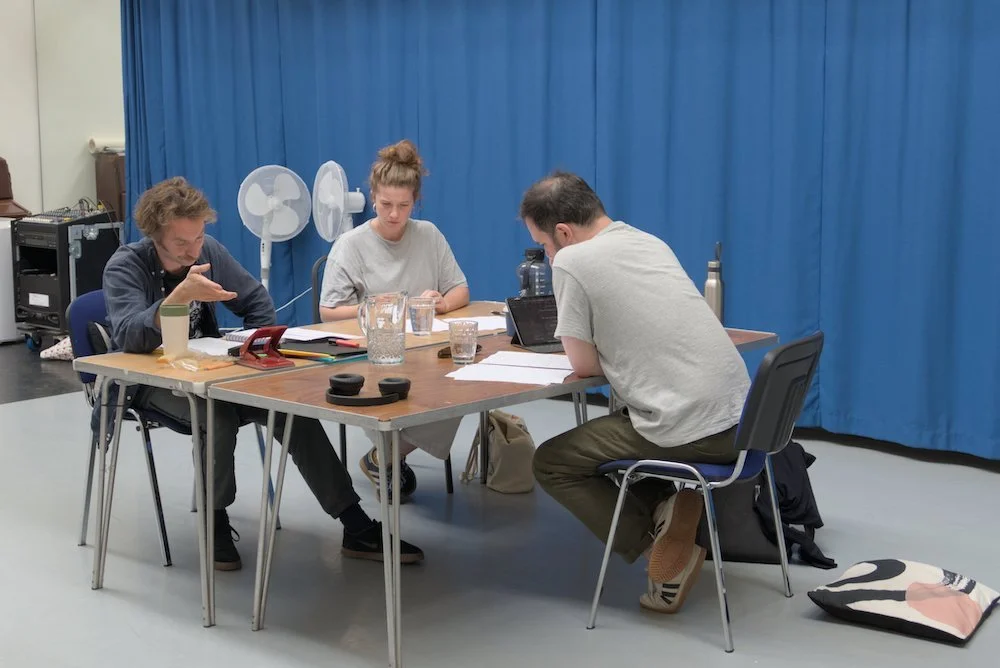Palestinian art at the Govanhill Festival: reflections on Ruh al Ruh
A moving open rehearsal at Glasgow’s Tramway offered audiences a glimpse into Ruh Al Ruh, a play by Gazan writer Rafat Al Aydi. Performed by local actors and directed by Finn den Hertog, the work explores love, survival, and artistic identity under siege – ahead of its Edinburgh debut as part of Welcome To The Fringe, Palestine.
Words and photo by Alex Durrant
On Saturday 9 August, I visited the Tramway to watch the open rehearsal of Ruh Al Ruh, showcased in Glasgow as part of the Govanhill International Festival and Carnival. Local actors Dylan Read and Karen Fishwick played the role of husband and wife, and Finn den Hertog directed the play. Through this rehearsal, I got to see a sneak peek of the final performance, which will take place in Edinburgh on Thursday 14 August as part of Welcome To The Fringe, Palestine.
Read more: Welcome to the Fringe Palestine
The rehearsal was a casual, comfortable event, as the actors and director sat around a table, read out their scripts and held lively discussions about they play. For the audience, chairs and beanbags were provided to watch the rehearsal. Audience members filtered in and out throughout the day.
Rafat Al Aydi wrote the play while in Gaza as a reflection on the ongoing genocide. Sara Shaarawi, a Welcome to the Fringe organiser, describes the challenges of bringing the play to the Fringe: “We decided quite early on that we weren’t going to try to bring them over from Gaza, because he didn’t necessarily want to leave his family. And also, there’s no route”. She reports that other Palestinian artists faced similar challenges.
However, the organisers of Welcome To The Fringe were determined to ensure Al Aydi could have a presence at the festival. Sara describes how they achieved this: “We proposed doing a rehearsed reading with local actors and a local director and have his voice – he wrote it originally in Arabic but he’s also translated it into English himself.” The Open Rehearsal is part of this project, giving Al Aydi’s voice a welcome in Glasgow before going on to the Fringe later this week.
The play depicts a husband and wife trying to survive the war. The impact of the bombings and killings surround the characters, and they describe even the process of obtaining food as if it were a battle with an uncertain outcome. They are in conflict in how to approach this struggle – the wife is a practical person who focuses on the need to adapt and survive, while the husband defines himself as an artist and does everything he can to hold on to this identity. While they disagree in their approaches, their love for each other is sweet and tender, and holds them together as the war threatens everything they care about.
The actors and director discuss how best to interpret and adapt the characters and translation, emphasising Al Aydi’s permission to make these adjustments. This turns the rehearsal into an experience of collaborative storytelling, with the audience members having the privilege to observe the process as it unfolds. The actors and director work out the intention of each scene: What is flowing behind a dialog which, at first glance, appears as a series of unconnected statements? How do you interpret a scene which, at first glance, appears to call existing characterisation into question? What is the emotional significance of one of the final twists in the play?
The result is a eye-opening window into the lives of ordinary Palestinians caught in the midst of the war, and the sacrifices they need to make simply to survive. But the play also provides a window into what resistance can look like, where voices and art triumph over guns and bombs. Al Aydi does this metatextually, through the husband’s own references from the frame of his artist persona, but also through the reading of the play itself.
Art is important, and artists’ voices are important. Welcome To The Fringe is doing excellent work bringing Palestinian voices to Scotland, showing how Palestinian culture can endure and resist the horrifying destruction of the ongoing genocide.
